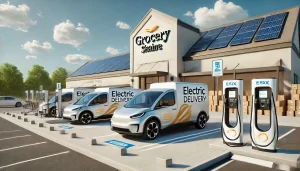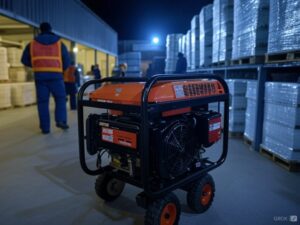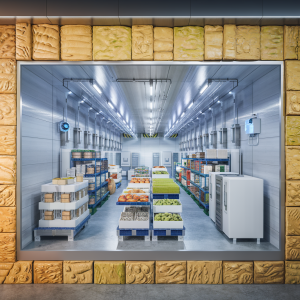The commercial refrigeration industry is experiencing significant changes as new technologies, environmental concerns, and evolving consumer demands shape the market. As we look ahead to 2024, several key trends are expected to dominate the commercial refrigeration landscape. From energy efficiency and sustainability to advanced technology and the use of natural refrigerants, businesses in this sector must stay ahead of these trends to remain competitive. In this article, we will explore the top trends in commercial refrigeration for 2024 and discuss their implications for the industry.
1. Energy Efficiency and Sustainability
One of the most prominent trends in commercial refrigeration is the growing focus on energy efficiency and sustainability. Businesses are increasingly aware of the environmental impact of their operations and are seeking ways to reduce their carbon footprint. In 2024, we can expect to see a surge in demand for energy-efficient refrigeration systems that minimize energy waste and optimize performance.
Manufacturers are developing innovative solutions to meet this demand, such as advanced insulation materials, improved compressor technology, and intelligent control systems. These advancements not only reduce energy consumption but also lower operational costs for businesses. Additionally, businesses are adopting sustainable practices like reclaiming and recycling refrigerants to minimize their environmental impact.
2. Adoption of Advanced Technology
The integration of advanced technology is another significant trend shaping the commercial refrigeration industry. The Internet of Things (IoT) and Artificial Intelligence (AI) are revolutionizing the way businesses manage and monitor their refrigeration systems. IoT-enabled sensors and devices collect real-time data, allowing businesses to optimize energy usage, track performance, and detect maintenance issues proactively.
AI-powered systems analyze vast amounts of data and provide actionable insights to improve efficiency and reduce downtime. Predictive maintenance algorithms can identify potential equipment failures before they occur, saving businesses time and money. Additionally, remote monitoring capabilities enable businesses to oversee their refrigeration systems from anywhere, enhancing operational efficiency and reducing the need for on-site personnel.
3. Rise of Natural Refrigerants
The use of natural refrigerants is gaining momentum in the commercial refrigeration industry. Natural refrigerants, such as ammonia, carbon dioxide, and hydrocarbons, have a lower environmental impact compared to traditional synthetic refrigerants. They have zero or minimal ozone depletion potential and significantly lower global warming potential, making them more sustainable alternatives.
In 2024, we can expect to see an increased adoption of natural refrigerants as businesses aim to meet regulatory requirements and reduce their environmental footprint. However, the safe handling and proper installation of natural refrigerants require specialized training and expertise. Businesses will need to invest in training their staff or work with qualified professionals to ensure the safe and efficient operation of their refrigeration systems.
4. Focus on Food Safety and Quality
Food safety and quality are critical considerations in the commercial refrigeration industry. Businesses must comply with strict regulations to ensure the freshness and integrity of perishable goods. In 2024, there will be a growing emphasis on maintaining optimal storage conditions to prevent food spoilage and minimize waste.
Advanced refrigeration systems equipped with temperature and humidity control mechanisms will become essential for businesses in the food and beverage industry. These systems will enable precise monitoring and maintenance of ideal storage conditions, ensuring that food products remain safe and of high quality throughout the supply chain.
5. Customization and Flexibility
In a rapidly changing market, businesses require refrigeration systems that can adapt to their evolving needs. The demand for customization and flexibility in commercial refrigeration is expected to rise in 2024. Businesses will seek modular systems that can be easily expanded or modified to accommodate changing storage requirements.
Modular refrigeration systems offer scalability and flexibility, allowing businesses to optimize their storage space and adapt to fluctuating demands. This trend will be particularly relevant for industries with seasonal variations in product demand, such as the food and beverage industry. Modular systems also enable businesses to replace or upgrade specific components without disrupting the entire system, reducing downtime and maintenance costs.
6. Emphasis on Food Waste Reduction
Reducing food waste is a global priority, and the commercial refrigeration industry has a crucial role to play in achieving this goal. In 2024, businesses will increasingly focus on implementing strategies to minimize food waste throughout the supply chain. This includes investing in efficient refrigeration systems that maintain optimal storage conditions and extend the shelf life of perishable products.
Smart monitoring and inventory management systems will enable businesses to track product expiration dates, optimize stock rotation, and reduce waste. By implementing these technologies, businesses can minimize losses due to spoilage and ensure that products reach consumers at their peak freshness.
7. Integration of Renewable Energy Sources
As businesses strive for energy sustainability, the integration of renewable energy sources into commercial refrigeration systems will become more prevalent in 2024. Solar panels, wind turbines, and other renewable energy solutions will power refrigeration systems, reducing reliance on traditional energy sources and lowering operational costs.
The integration of renewable energy will not only reduce carbon emissions but also provide businesses with long-term energy cost savings. Leveraging renewable energy sources in combination with energy-efficient refrigeration systems will enable businesses to achieve their sustainability goals while maintaining optimal operational performance.
8. Growth of Cold Chain Logistics
The growth of e-commerce and the increasing demand for online grocery delivery have fueled the expansion of cold chain logistics. In 2024, we can expect to see a continued rise in the demand for refrigerated transportation and storage facilities. This trend will drive the need for advanced refrigeration systems that can maintain precise temperature control during transportation and storage.
Businesses will invest in refrigerated vans, trucks, and containers equipped with IoT-enabled temperature monitoring systems to ensure the integrity of perishable goods. Cold storage facilities will also adopt energy-efficient refrigeration systems to minimize energy waste and reduce operational costs. The expansion of cold chain logistics presents significant opportunities for businesses in the commercial refrigeration industry.
9. Enhanced Data Analytics and Predictive Analytics
Data analytics and predictive analytics will play a crucial role in optimizing commercial refrigeration systems in 2024. Businesses will leverage data collected from IoT-enabled devices to gain insights into energy consumption patterns, system performance, and maintenance needs. Advanced analytics algorithms will enable businesses to identify energy-saving opportunities, predict equipment failures, and optimize system performance.
Predictive analytics will enable businesses to proactively address maintenance issues, reducing downtime and improving overall operational efficiency. By harnessing the power of data, businesses can make informed decisions, optimize energy usage, and maximize the lifespan of their refrigeration systems.
10. Collaboration with Sustainable Suppliers
In line with the growing emphasis on sustainability, businesses in the commercial refrigeration industry will seek partnerships with sustainable suppliers in 2024. Collaboration with suppliers that prioritize environmentally friendly practices and offer energy-efficient products will be a priority for businesses aiming to reduce their environmental impact.
Sustainable suppliers will provide businesses with access to energy-efficient refrigeration systems, natural refrigerants, and other sustainable solutions. This collaboration will enable businesses to align their operations with their sustainability goals and meet the increasing demand for eco-friendly products and services.
11. Regulatory Compliance
Regulatory compliance will remain a key consideration for businesses in the commercial refrigeration industry in 2024. Governments around the world are implementing stricter regulations to reduce greenhouse gas emissions and promote energy sustainability. Businesses will need to stay updated on the latest regulations and ensure compliance with environmental standards.
Compliance with regulations related to refrigerant usage, energy efficiency, and waste management will be essential. Businesses will need to invest in training their staff and implementing systems and processes that enable them to meet regulatory requirements. Failure to comply with regulations can result in penalties, reputational damage, and legal consequences.
12. Continued Innovation and Research
The commercial refrigeration industry is characterized by continuous innovation and research. In 2024, businesses will invest in research and development to develop cutting-edge refrigeration technologies and solutions. This will include the exploration of new refrigerants, the development of more energy-efficient systems, and the integration of advanced sensors and controls.
Collaboration between industry stakeholders, including manufacturers, researchers, and policymakers, will drive innovation and shape the future of commercial refrigeration. Businesses that prioritize research and development will be at the forefront of industry advancements, gaining a competitive edge and meeting the evolving needs of their customers.
Conclusion
The commercial refrigeration industry is undergoing significant transformations driven by factors such as energy efficiency, sustainability, advanced technology, and changing consumer demands. In 2024, businesses in this sector must adapt to these trends to remain competitive and meet regulatory requirements. By embracing energy-efficient systems, integrating advanced technology, and prioritizing sustainability, businesses can optimize their operations, reduce costs, and contribute to a more sustainable future.







